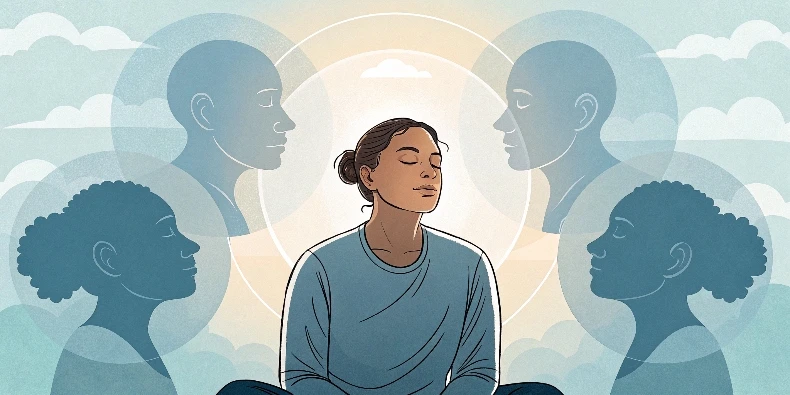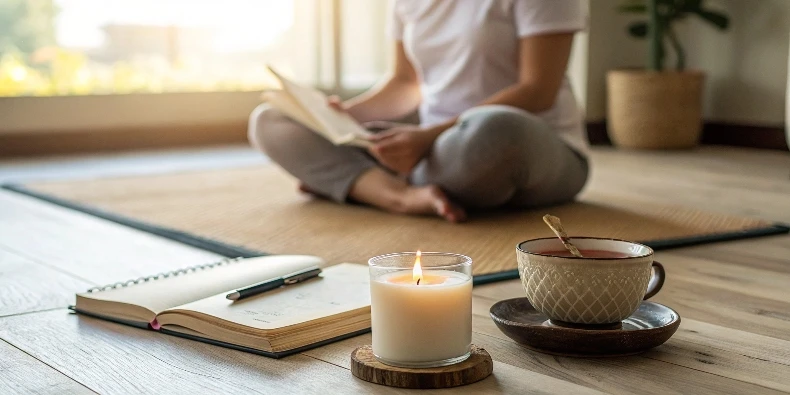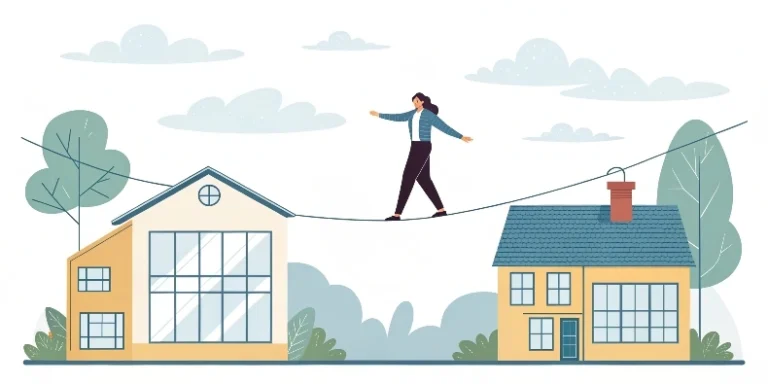What is self-awareness: Why it matters and how to develop it

Self-awareness is an essential part of human life. To truly understand yourself, you need to know what motivates you, what brings you joy, and what values lie at the core of your decisions.
The ability to recognize your strengths and weaknesses, to learn from your own mistakes—these are all things that help you make more conscious choices and build a life with direction and meaning. Gaining a deeper understanding of yourself is the answer to the question: why self-awareness is important and how to develop it.
What is self-awareness
Self-awareness is the ability to understand and manage your own emotions and reactions. It helps you recognize your strengths and weaknesses, as well as identify internal triggers. Through this inner understanding, we shape our personality, actions, values, beliefs, emotions, and thoughts.
If you break down the word itself—“self” and “awareness”—it points to turning inward through reflection. When we face a challenge or try to make sense of something, the ability to look within is exactly what defines human self-awareness in action.
In everyday life, practicing self-awareness allows us to respond more calmly to people and situations. By acknowledging what we feel and why, we begin to manage ourselves more effectively—and as a result, reduce the likelihood of unnecessary conflict.
How Self-Awareness Differs from Self-Discovery
Self-awareness and self-discovery are often seen as the same thing, but in reality, they are two distinct processes. Understanding the difference between them is essential if you want to stay clear about your goals and approach to personal development.
Self-awareness is the ability to observe your thoughts, emotions, and behavior in the moment. It helps you track how you react to different situations—why you get angry, excited, or lose motivation. It’s the skill of paying attention to yourself right now, in real time.
Self-discovery, on the other hand, is a deeper and more long-term process. It’s about figuring out who you are, what matters to you, and what shaped your beliefs, behaviors, and worldview. This is a gradual exploration through memory, reflection, and analysis.
Both concepts are important for personal growth and self-discovery, but they serve different purposes. Self-awareness allows you to act consciously, while self-discovery helps you understand your deeper values, goals, and inner nature.
📌 Here’s a simple comparison table to clarify the difference:
| Self-awareness | Self-discovery | |
|---|---|---|
| Timeframe | Present moment | Past and present |
| Essence | Awareness of emotions and reactions | Exploring oneself as a person |
| Tools | Mindfulness, observation | Reflection, analysis, introspection |
| Purpose | Managing behavior here and now | Understanding deep motives and personal values |

✧ Real-life example:
You come home feeling irritated after work. Self-awareness helps you notice this state before you take it out on someone. Self-discovery might reveal that your frustration isn’t just about today—it stems from ongoing dissatisfaction with your job, something you’ve been sensing but haven’t yet admitted to yourself.
This kind of insight is the foundation of meaningful change—and that’s exactly why it’s so important to understand the difference between self-awareness and self-discovery.
Types of self-awareness
There are two main types of self-awareness:
- personal
- public
Personal self-awareness is the ability to recognize aspects of yourself that remain hidden from others. This includes your inner thoughts, emotions, needs, motivations, and experiences. It’s the understanding of your own preferences, fears, desires, or abilities. For example, someone might be fully aware of their fear of public speaking, even though it doesn’t show on the outside. These kinds of examples of self-awareness may seem minor, but together they shape our inner sense of self.
Public self-awareness, on the other hand, relates to how we think others perceive us. We pay attention to our appearance, behavior, and speech—anything that might influence how we’re viewed by the people around us. This kind of awareness develops over time and can shift depending on the situation, social role, or environment.
The two types are interconnected. Personal self-awareness is often shaped by external feedback, while public self-awareness, in turn, can influence our self-esteem and how we feel about ourselves internally. Finding a balance between the two helps us better understand who we are and interact with the world in a more grounded way.
Why self-awareness is important
To act consciously, we need to understand what’s happening inside us. Without that, we tend to react automatically—based on habits, impulses, or mood. In such a state, it’s hard to manage ourselves, build relationships, or make thoughtful decisions.
This is why self-awareness is important: it gives us the ability to pause and recognize what we’re feeling, why we’re reacting a certain way, and what we truly want. It’s an inner compass that helps us move in the right direction rather than drift aimlessly.
Understanding yourself matters not just in moments of crisis or big choices. It affects how we relate to others, how we set goals, how honest we are with ourselves, and how comfortable we feel in our own lives. Without it, it’s hard to distinguish our genuine desires from those imposed by others.
For anyone who wants to get to know themselves better, it’s worth starting with a simple question: how to understand yourself? The answer doesn’t lie in theory, but in self-observation—in the willingness to take an honest look at your feelings, motives, and behavior.
How to develop self-awareness: a step-by-step guide
Developing self-awareness is not a one-time effort, but an ongoing process that unfolds gradually and accompanies us through different stages of life. It begins in childhood, when we first become aware of our emotions, and continues into adulthood—through reflection, experience, and observation of ourselves. Below are several steps that can help anyone looking to understand themselves more deeply.
Recognize your strengths and weaknesses
The first step is to acknowledge where you feel confident and where you face challenges. This isn’t about harsh self-criticism—it’s about honest recognition of what you do well and where there’s room to grow. Such clarity helps you set priorities: what deserves your focus now, and what can wait.
Ask yourself important questions
To understand yourself better, it’s helpful to pause regularly and ask simple yet precise questions:
- What do I need to work on?
- How do I feel right now?
- What are my thoughts about this day?
- Have there been any changes in my behavior?
- Do I feel joy, anxiety, fatigue—and why?
These types of self-reflection questions help uncover hidden emotions and track internal patterns that might otherwise go unnoticed.
Be honest with yourself
Sometimes we hide the truth even from ourselves—out of fear, habit, or insecurity. But honesty is where inner stability begins. Admitting that you don’t always have it together, that you have weaknesses, isn’t a flaw—it’s the foundation of strength. You can’t truly develop self-awareness without this step.
Understand your personality type
Everyone experiences the world—and themselves—in their own way. Some draw energy from being around others, some from solitude. Some resist change, others crave it. Knowing your personality type is one of the keys to learning how to develop self-awareness.
There are many models—from simple categories like extrovert and introvert to more nuanced personality frameworks. The better you understand how you’re wired, the easier it becomes to shape a life that aligns with your nature.
Identify your core values
Your values are your internal compass. When you’re clear on what matters to you, decision-making becomes easier and more confident. Having an honest conversation with yourself about your priorities helps not only with self-understanding but also with building a more intentional, authentic life.
Mindfulness practices for developing self-awareness

If you want to truly understand yourself, reading a book or taking a personality test isn’t enough. Real self-awareness is shaped through experience—by observing your reactions, thoughts, and emotional states in everyday situations. That’s what mindfulness practices are for: they help cultivate inner sensitivity and allow you to stop living on autopilot.
✧ Keeping a self-awareness journal
A self-awareness journal is a tool that lets you step back and look at yourself from the outside. Writing regularly helps track recurring emotions, situations, and internal responses. Over time, it becomes easier to see what influences your mood and behavior.
The format can be whatever works for you, but it’s helpful to begin with a few simple questions:
- What did I feel today?
- When did I not feel like myself?
- How did I respond?
- What would I like to change about my reaction?
This practice doesn’t take much time, but it gradually gives you a clearer picture of your inner world. It’s especially valuable for those who want to understand themselves more deeply and make more conscious choices.
✧ Meditation and mindful breathing
You can’t develop mindfulness without learning to pause. Meditation helps you do just that. It doesn’t require anything fancy—just a quiet place and 5–10 minutes a day to observe your breath and thoughts.
This trains you to shift your attention from external noise to internal processes. Even a simple mindful breathing practice can be especially helpful in moments of stress, anxiety, or confusion. With repetition, it gets easier to stay connected to yourself, even in difficult situations.
✧ Everyday mindfulness
Being mindful doesn’t mean meditating all the time. It’s about how you live your ordinary days. A walk, a conversation, even a routine task—any of these can be a chance to observe yourself. You just need to pause now and then and ask: “What am I feeling right now?”, “What am I thinking as I do this?”, “What do I want in this moment?”
This kind of simple reality check helps you see where you’re acting automatically—and where your actions are coming from a more genuine place.
✧ Emotional intelligence and self-awareness
Self-awareness and emotional intelligence go hand in hand. When you understand what’s happening inside you, you’re better equipped to deal with emotions—your own and others’. This is especially important in communication: the ability to hear others starts with the ability to hear yourself.

Improving emotional intelligence isn’t about having a natural gift—it’s a skill you can develop. Learn to ask yourself questions like: “Why did I react so strongly?”, “Whose behavior triggered this feeling—and why?”, “How else could I express this?” These reflections help reduce inner tension and improve the quality of your interactions.
Conclusion: the path to deeper self-understanding
Self-awareness isn’t some abstract concept or an end goal in itself. It’s a process—one in which you learn to be honest with yourself, to recognize your reactions, emotions, and desires. It takes time, attention, and patience, but through this process comes that inner sense of grounding we so often lack.
If you’ve read this far, you already have an interest in getting to know yourself. You don’t have to change everything at once. Start small: choose one practice and try it today. It might be a short journal entry, a mindful walk, or a simple question to yourself: “How am I really feeling right now?”
These steps may seem minor, but they lay the foundation for a deeper and more stable connection with yourself. And that is the true path to becoming a more self-aware person—unhurried, but intentional.



